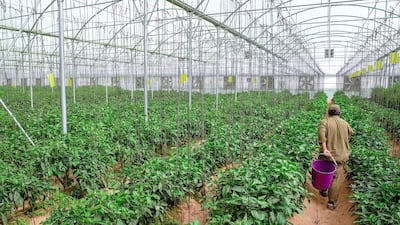A radical change is needed in the way we produce and consume food to eliminate hunger by 2030, it has been warned.
The World Food Security Forum on Monday heard that harnessing technology to increase sustainable food production is crucial in curbing food shortages if the world is to meet the key UN Sustainable Goal Development goal.
The forum heard if the current path is maintained then the world will fail to meet the key target.
“The world has experienced huge changes because of Covid-19,” said Mohammed Ali Al Shorafa, chairman of Abu Dhabi Department of Economic Development.
“Now more than ever we need to focus on food security as millions have been affected by supply chain disruptions and consumer demand.
“For several years Abu Dhabi has been utilising modern technology to increase the agritech production.
“While there are initiatives to encourage people to step into this industry, we need more programmes and incentives to encourage entrepreneurs to invest in the agritech sector to ensure long-term food resilience and stability.”
Hunger – along with lifestyle diseases, food waste and environmental degradation – is the result of a broken food system and a global effort is needed to improve the food landscape.
Current United Nations estimates show that nearly 690 million people are hungry or undernourished – up by 10 million in just one year.
The Covid-19 pandemic has exacerbated the situation due to the economic and logistical pressure on food production and export.
During the forum, experts discussed how the industry needs to fast track water- and energy-smart food production.
From vertical farming, hydroponics and advanced irrigation systems to using treated wastewater to grow crops, they can all help to reduce water use and increase local food production.
Consumer behaviour towards food also came under the spotlight. Higher demand for more convenient, processed foods as well as meat and dairy were all contributing towards environmental degradation. And in turn, that has affected food production in less developed countries.
Mariam Al Mheiri, the UAE's Minister of State for Food Security, said diets have to change and local food produce must be encouraged.
“We need to improve consumer behaviour with food now, it is an essential component of national food security,” she said.
“By encouraging a better diet it will have a knock on impact on improved food production globally.”
If recent trends continue, the number of people affected by hunger will surpass 840 million by 2030, or 9.8 per cent of the global population.
As part of United Nations Sustainable Development Goal Two to tackle hunger, several targets need to be met to achieve its outcome.
By 2030, the world needs to double the agricultural productivity and incomes of small-scale food producers, in particular family farmers and in developing countries. This can be achieved through securing equal access to land and knowledge transfer from agritech start-ups.
Sustainable food production systems need to not only increase production but also adapt to changes in climate and extreme weather.
The World Food Security Forum Middle East and North Africa convened government and industry leaders from across the region to discuss sustainable agriculture and food security.














